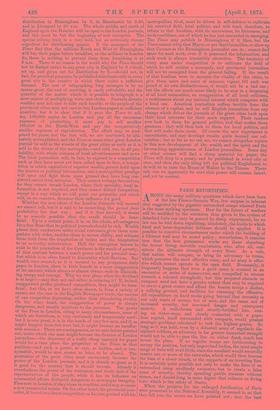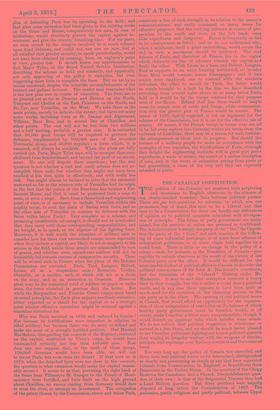PARIS REFORTIFIED.
AMONG the many military questions which have been born of the late Franco-German War, few surpass in interest that suggested by the gigantic entrenched camps whereof Paris is the most striking specimen. How far the future of warfare will be modified by the extension thus given to the system of detached forts can only be proved by sharp experiment, for no law can be laid down regulating, absolutely, the limits to which fixed and inter-dependent defences should be applied. It is possible to conceive circumstances under which the building of a Chinese wall may be sound policy ; nevertheless, it remains true that the best permanent works are those absorbing the fewest living movable combatants, who, after all, con- stitute the ultimate strength of every State. As a rule, that nation will conquer, or bring its adversary to terms, which possesses the most effective army, and no army is effec- tive which cannot operate in the open field. Necessarily, it frequently happens that even a good army is worsted in an encounter or series of manoeuvres, and compelled to retreat towards a selected stronghold ; but this prepared obstacle to conquest need not have a greater extent than may be required to cover a great centre and afford the beaten troops a shelter, a rallying ground, and facilities for resuming the offensive. All expenditure on fixed works going beyond that necessity is not only waste of money, but of men, and the cause not of increased security, but increased danger and consequent anxiety. A well-chosen and stoutly-fortified line, rest- ing on water-ways, and closely connected with a popu- lous capital, itself surrounded with ramparts, would present strategic problems calculated to task the highest genius. So long as it was held, even by a defeated army of regularly dis- ciplined soldiers, an adversary in far greater numerical strength would not be able to pass the line on either flank, much less invest the place. If no regular troops are forthcoming to occupy the position, but only improvised bodies, the most ample range of forts will avail little, since the assailant would assuredly master one or more of the outworks, which would then become the base of a closer attack, or the supports of an investing line. It is certainly quite possible not only to make the lines of an entrenched camp needlessly extensive, but to create a false sense of security, thereby spending public treasure without ieason, and diminiihing in some degree that reliance on living force which is the safety of States.
When the projects for the enlarged fortification of Paris were presented to the National Assembly, it seemed to is that they fell into the errors we have pointed out ; that the best
plan of defending Paris was by operating in the field ; and that after some extension had been given to the existing works on the Seine and Marne, comparatively few men, in case of misfortune, would absolutely protect the capital against in- vestment and give the country breathing-time. For our parts, we were struck by the dangers involved in so much reliance upon fixed defences, and could not, nor can we now, feel at all satisfied that greater security, to speak paradoxically, would not have been obtained by running, from an engineer's point of view, greater risk. It should lessen our apprehensions to find Major Tyler, at the Royal United Service Institution, describing the scheme as bold and masterly, and apparently not only approving of the policy it embodies, but even suggesting more forts to complete the lines. But we are by no means reassured, despite the scientific accomplishments of the learned and gallant lecturer. The reader may remember what is the new plan now in course of execution. The forts are to be planted out as far as Domont and Ecouen on the North, Vanjours and Chelles on the East, Palaiseau on the South, and St. Cyr, near Versailles, on the West. We take these as the main points, merely to indicate the extent; but there are many more works, including forts at St. Jamme and Aigremont, Villeras, Haut Buc, and in second line at Chatillon and other points. The cost will not be less than two millions and a half sterling, probably a greater sum. It is estimated that 30,000 good troops will be required to garrison the defences, supplemented by 100,000 men of the so-called Territorial Army, and 50,000 regulars ; a force which, it is assumed, will always be available. When the plans are fully carried out, Paris, Major Tyler says, will be stronger than ever, sheltered from bombardment, and beyond the peril of an invest- ment. No one will dispute these assertions ; but the real question is not whether a vast and costly scheme does not ac- complish these ends, but whether they might not have been reached at less cost, quite as effectively, and with really less risk. One might almost be inclined to infer that the extension westward as far as the western side of Versailles had its origin in the fact that the palace of the Bourbons has become a Par- liament House, and that it must be protected from a coup de main, or even a siege. Save from a theoretical and engineering point of view, is it necessary to include Versailles within the mighty rayon, to stud the plain of Saclay with forts, and on the other side of Versailles to connect its defences with the Seine valley below Paris ? Very complete as a scheme, and promising considerable advantages, it should not be overlooked that they carry with them corresponding responsibilities, and are bought, so to speak, at the expense of the fighting force. Moreover, it is well worth the attention of military men to consider how far these vast entrenched camps, more especially when they include a capital, are likely to act as magnets to the armies in the field, unless these armies are commanded by men of genius, and whether even second-rate soldiers will not be irresistibly led towards centres of comparative security. There will be several such in France, when the plans of the Defence Commission are executed. Paris, Toul, Langres, Belfort, Lyons, all on a stupendous scale ; Besancon, Verdun, Grenoble, on a smaller, each of which will act as a drain on the army, and as an attraction to Generals. However great may be the numerical total of soldiers on paper or under arms, the fewer absorbed in garrison duty the better. But while the Burgundian and Franche Comte camps seem based on sound principles, the Paris plan appears needlessly extensive, either regarded as a shield for the capital or as a strategic point whence offensive operations might be resumed against a sometime victorious foe.
Why was Paris invested in 1870 and reduced by famine ? Not because its fortifications were imperfect in relation to rifled artillery, but because there was no army to defend and make the most of a strongly fortified position. Had Marshal MacMahon, disregarding the counsels of the Regency, retreated on the capital, reinforced by Vinoy's corps, he would have commanded certainly, not less than 140,000 men. Now does any one suppose that, in the teeth of these troops, 150,000 Germans would have been able, we will say to invest Paris, but even cross the Seine? If that were so in 1870, when the detached forts were too close to the enceinte, the question is what extension would make the capital reason- ably secure ? It seems to us that, providing the right bank of the Seine from Villeneuve St. Georges to the Forest of Mont- morency were fortified, and forts built on the high ground about Chatillon, no enemy coming from Germany would dare to cross the river, or attempt an investment. The occupation of the points chosen by the Commission, above and below Paris, constitute a line of such strength in its relation to the enemy's communications, and really command so many issues for offensive purposes, that the outlying defences in course of pre- paration to the south and west, on the left bank, seem alike superfluous and dangerous. Excess is frequently as bad in its consequences as defect ; and we do not understand why, when a minimum, itself a great undertaking, would secure the end in view, a maximum should be preferred. The real defence of Paris, and therefore of France, lies in the region which obstructs one line of advance towards the capital and flanks the other. With Lyons as a base, and Belfort, Langres, Toul as supports to an army fronting northward, no invader from Metz would venture across Champagne ; and if two armies were employed, one to contend with the southern defenders, the other to march on Paris, the latter would be surely brought to a halt by the line we have described stretching from several miles above to as many below Paris, held as it would be by the troops retained for that purpose west of the Meuse. Behind that line there would be ample room for camps, store of cattle and forage, while communica- tion with the greater part of France would be secure. The lesson of .1870, rightly regarded, is not an argument for the scheme of the Commission, but it is one for the effective use of armies. Of course, if the French troops in future wars are all to be led away captive into Germany within six weeks from the outbreak of hostilities, there may be a reason for such tortoise- like arrangements as those now in progress. But should the fortune of a military people be more in accordance with the examples of two centuries, the fortifications of Paris, although they delight the engineering instincts will in great part prove superfluous, a waste of money, the source of a useless absorption of men, and, in the event of calamities arising from panic or bad generalship, a cause of the very evil they are expressly intended to parry.



































 Previous page
Previous page